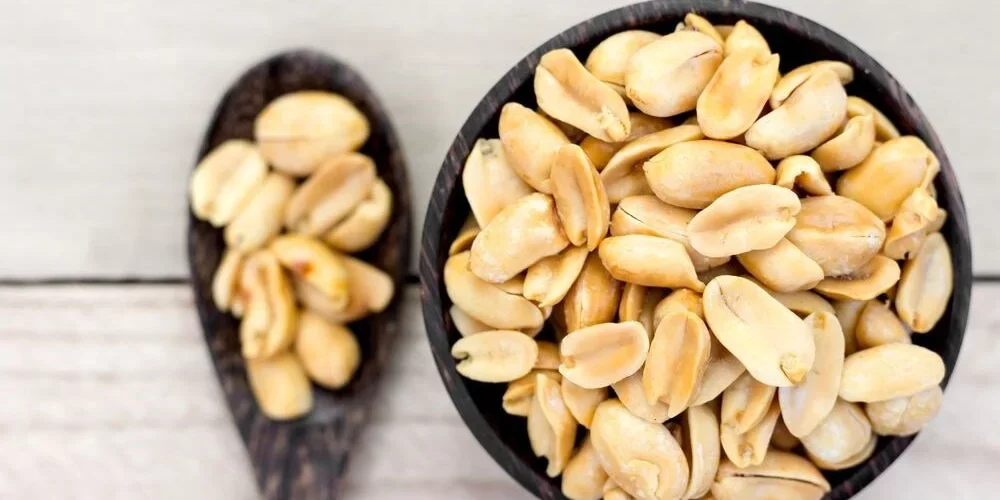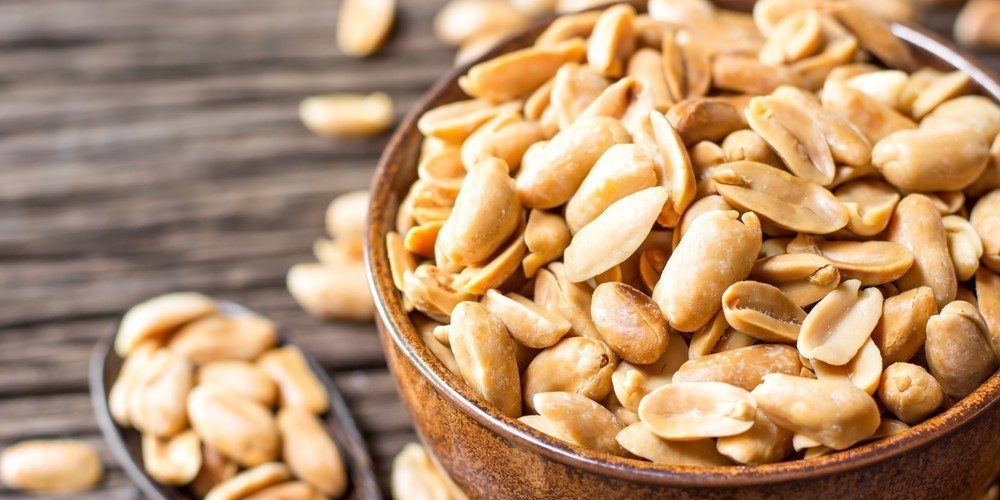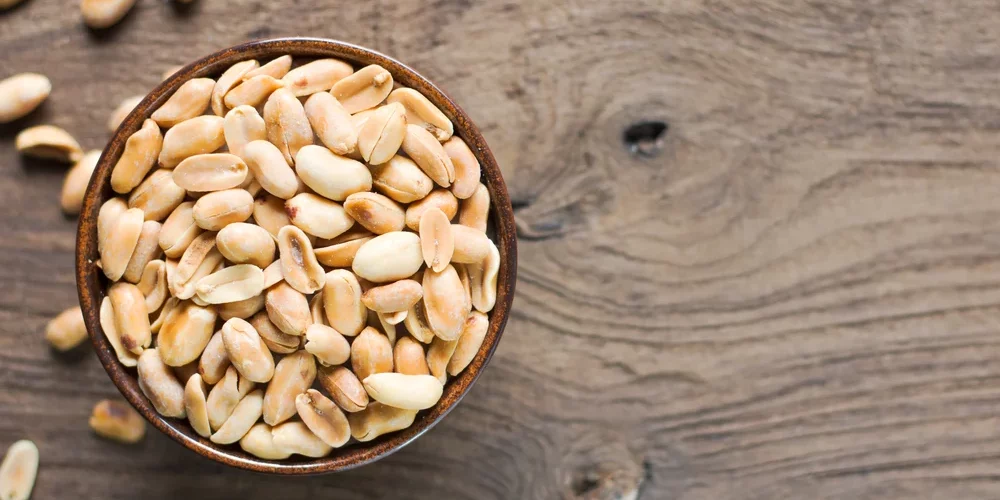Even though peanuts can last for a very long time, if you don't know how to store them, they will still start to smell and taste awful. Try to roast your peeled peanuts to increase their shelf life. There are still storage techniques that you may consider if you want to increase the shelf life of peanuts considerably, if not permanently. Follow these instructions to store shelled peanuts: Make sure the peanuts are totally dry before putting them in an airtight container or a ziplock bag. These may be kept in the closet for about three months. You may keep them in the fridge for about 6 months to increase their shelf life. To make sure there isn't condensation on the interior of the container, make sure you check them every few weeks. For around nine to twelve months, you may freeze them and keep them in an airtight container or freezer bag. When you're ready to eat them, you may put a tray of valencia peanuts in the oven if they start to taste a bit stale. At 350 degrees Fahrenheit, roast them for around 10 minutes (177 degrees Celsius).
Because the majority of the moisture from the nuts is removed during roasting, roasted peanuts have the greatest shelf life. They are less likely to get rancid as a result. Put the roasted peanuts in a ziplock bag or an airtight container. These may be kept in the fridge for around four to six months. Make careful to check the container frequently to make sure the peanuts are well dried. Put your peanuts in a freezer bag and keep them there for around a year if you want to preserve them for longer. After roasting your peanuts, vacuum them to ensure they stay fresh for as long as possible. One of the safest methods to keep peanuts for a long time is to do this since it will completely remove all the oxygen from the bag. Before vacuum-sealing the bag, you can additionally add a specific package for oxygen absorption. Any gases that are stored in the raw peanuts will be absorbed by this. Your peanuts may now be safely stored in the pantry or the refrigerator for around a year after being vacuum-packed.
boiled peeled peanuts
After the peanuts shell has been removed, the peanuts are called blanched or peeled. A common way of eating peeled peanuts is trying them boiled. The boiling process gives the peanuts a better flavor most of the time. Raw dry peanuts that are not in their shells are commonly accessible, and it is possible to buy them at a lower price. You can prepare peanut butter in a food processor if you don't enjoy eating them raw or if they give you indigestion, or you can roast them in a fan oven at home in a single layer of nuts on a metal sheet (this takes 25 minutes at 300F). Has anyone tried removing the peanuts from their shells by boiling them? After all, it is possible to boil a wide variety of dried peas and beans without first removing them from their pods. Some examples are yellow and green peas that have been split, chickpeas or garbanzo beans, and soybeans. Although I am aware that it is customary to boil the peanuts and serve them in their shells, I have been unable to locate any material that suggests using peanuts that have not had their shells removed. They will cook a little bit faster without the shells, so make sure to check on them frequently to determine whether they have reached the desired level of softness. Allow the salted peanuts that have been cooked to soak in the brine as they cool so that they can acquire a flavor that is juicier.
how to roast raw peeled peanuts
Have you ever tried to roast peanuts on your own? If you have always desired to roast your raw peanuts that are peeled at home, but you don't know how to do so, you may do it by following this easy step-by-step tutorial after assembling the necessary ingredients. The health benefits of roasted peanuts are numerous. In point of fact, a single serving of roasted peanuts is loaded with a variety of nutrients, including manganese, copper, and niacin, as well as other vitamins and proteins. The healthiest preparation of raw peanuts is drying and roasting them with very little or no salt at all. On the other hand, if they are fried in oil, they could have high salt and saturated fat content. Step 1 To get things started, turn the oven temperature up to 350 degrees Fahrenheit. After removing the peanuts' shells, give them a thorough washing in some lukewarm water that is running from the faucet.
The next step is to lay each one out on a paper towel and then use a separate paper towel to pat each one dry. Step 2 Spread the raw peanuts out in a single layer on one or more pans using a baking sheet that has not been oiled. Step 3 Place the cookie sheets in the oven and turn the temperature up to 450 degrees Fahrenheit. The nuts should be stirred while you rotate the cookie sheet. They need another 15 minutes of roasting at this temperature. The overall roasting time for peanut tree that have been shelled is fifteen minutes. Step 4 Take the cookie sheets out of the oven and set them aside. Add salt. Give them time to cool. At our company, you may get peanuts in a number of different preparations. Whether you prefer raw or roasted peanuts, you may enjoy them in the form of a nutritious snack that will give you a surge of energy. In addition to this, they are wonderful presents. Have a look at our tempting collection of nuts, all of which are of the highest possible quality. 
how to store peeled peanuts
How long can we store peanuts once they have been shelled and then peeled? It depends on the circumstances of storage to a significant degree; because of the huge amount of oil that they contain, peanuts need to be stored carefully in order to avoid turning rancid. After opening the package of peeled peanuts, place the peanuts in a container that can be sealed airtight or place the original package in an airtight container heavy-duty freezer bag to prolong their shelf life. Keeping peeled peanuts in a cool and dry location will allow them to maintain their freshness for longer. The shelf life of peeled peanuts may be extended further by storing the peanuts in the refrigerator or freezer; keeping the peanuts in a container that is airtight and sealed, or placing the original packaging in a freezer bag that can be resealed and is made of heavy-duty material. The flavor and consistency of peeled peanuts are not significantly altered if they are repeatedly thawed and frozen throughout the allotted time for storage in the freezer. How long can peanuts that have been peeled be kept in the freezer before they go bad? The time indicated for freezing is intended for achieving the highest possible quality; food that is maintained at a temperature of 0 degrees Fahrenheit will remain safe permanently. What are the telltale signs when peeled peanuts have gone bad? Peanuts that have gone bad typically take on a bitter and terrible flavor. If red skin peanuts take on an unpleasant odor or taste, or if mold begins to grow on them, they should be thrown away. 
do you have to peel peanuts for peanut butter
When it comes to preparing peanut butter, you have to peel the peanuts first. You do require to do so, thereby ending up with an acceptable commercial outlook. Peanut butter is an item that is extremely well known and consumed all over the world. The creation of peanut butter includes the steps of shelling the peanuts, baking them, peeling them, grinding them into a paste, and finally packaging the finished product. The production of peanut butter requires the completion of these operations as crucial phases. However, many individuals question whether or not peeling peanuts is indeed required. Why are you unable to utilize peanuts that have not been peeled? How to peel roasted peanuts using a machine that peels roasted peanuts. In most cases, the peanuts that are used to produce peanut butter do not need to be peeled. However, the unpeeled peanuts have a flavor that is more astringent. You don't need to peel the peanuts if you create peanut butter at home; you may use whole peanuts instead. To be used in commercial manufacturing, it must, however, have a flavor that is sweet and unctuous. To remove the peanut skins, therefore, the vast majority of producers rely on the roasted peanut peeling machine. Additionally, roasted peanuts are required to be included in the recipe. Because roasted peanuts were used to manufacture the butter, the finished product will have the flavor of roasted peanuts. 
how to make boiled peanuts
Peanuts that have been boiled are just raw peanuts that have been cooked in salted water for some hours. Are you interested to learn how you can make them? These salty soft peanuts are sure to become an addiction, especially when paired with ice-cold cola. Because the shells absorb part of the water, it may spray out at you as you bite into them to pull the nut out. This makes the process a little bit messier as well. People often eat them outside, where they are free to throw away the shells and are less likely to be bothered by the drips of salt water. The peanuts will grow increasingly salty the longer they are allowed to boil in the salted water or remain in the water. Additionally, the shells of the peanuts will become more malleable the longer they are cooked. Some individuals like their peanut shells to be soft and nearly chewy, while others like them to be a little bit hard so that the shells can be pried apart.  Begin with a little number of peanuts while you are learning how to make boiling peanuts for the first time. If they turn out to be overly salty, try using a little less the next time. Cook them for a longer period of time if you like them to be softer. It is appropriate for the insides of the nuts themselves to be entirely soft. They require more cooking time if you like a crispy or crisp texture. Rinse the peanuts: Give raw, unshelled peanuts several changes of water until the water runs clear. Put the water, salt, and seasoning in a large stockpot, along with the peeled peanuts, and bring to a boil: Keep a low boil going by covering the pot and reducing the heat by just a little bit. To get the required degree of tenderness in the peanuts, boil them for two to three hours, or even longer (some people boil their peanuts all day long). Drain and consume all of it during the next few days: Dry peanuts have a longer shelf life than boiled peanuts do.
Begin with a little number of peanuts while you are learning how to make boiling peanuts for the first time. If they turn out to be overly salty, try using a little less the next time. Cook them for a longer period of time if you like them to be softer. It is appropriate for the insides of the nuts themselves to be entirely soft. They require more cooking time if you like a crispy or crisp texture. Rinse the peanuts: Give raw, unshelled peanuts several changes of water until the water runs clear. Put the water, salt, and seasoning in a large stockpot, along with the peeled peanuts, and bring to a boil: Keep a low boil going by covering the pot and reducing the heat by just a little bit. To get the required degree of tenderness in the peanuts, boil them for two to three hours, or even longer (some people boil their peanuts all day long). Drain and consume all of it during the next few days: Dry peanuts have a longer shelf life than boiled peanuts do.





0
0